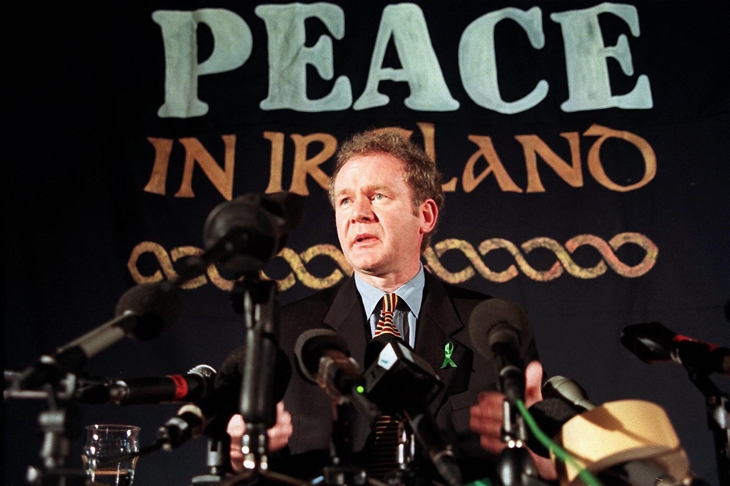Ulster is where memory burns long and forgiveness comes slow. The death of Martin McGuinness will pass without the spilling of sorrow by many Unionists in Northern Ireland and here in mainland Britain, where the IRA’s terror campaign paid regular, outrageous visits, there will be those who mutter a cold ‘good riddance’.
Douglas Murray writes:
‘[W]hile the eulogists lament the fact that McGuinness hasn’t enjoyed much of his old age, our thoughts really ought to be with the many people who – thanks to McGuinness and his friends – never made it as far as middle age.’
This is undoubtedly true. McGuinness was a terrible man who did terrible things and the good things he did in later years did not change that.
I grew up in Coatbridge, the Lanarkshire town once known as ‘Little Ireland’ for the size of its Catholic population of Irish descent. Although by the 1990s popular republicanism was mostly of the folk variety — rebel songs and walls etched in Tiocfaidh ár lá — McGuinness (and Gerry Adams) were still admired by the old, who had learned about sectarianism in the streets rather than the history books, and the young, who wanted to rebel against their integrated, more prosperous parents.
None of this touched me. In fact, it baffled me. To me, the IRA were not the romantic heroes of self-pitying ballads; Bobby Sands was nothing more than a terrorist who committed suicide. So no, I won’t lament the death of Martin McGuinness, other than to acknowledge the grief his loved ones will be feeling. But I have to take issue with Douglas on something. He writes:
‘Over recent years a narrative has developed around the Troubles, that the people who ‘became men of peace’ are much to be admired. This narrative overlooks the fact that the real people to be admired are those from all sides who – despite sharing many or all of the same grievances as the ‘men of violence’ – never thought the answer to their grievances lay in pulling out the finger-nails of people on the other side of the sectarian divide, planting bombs in shops or shooting farmers in the head.’
Of course those who never took up the gun are the ones who chose the proper and moral path. But in arms lay power, a fearsome power to make a distant government shake, to kill its soldiers, to hold its citizens hostage to menace. Through violence and mythology, men like McGuinness became warrior-leaders to their people. The decision to make peace was not a commerce between rifles and power but a relinquishing of untrammelled power for the checks and balances of democratic power-sharing.
It was a concession that terrorists around the world have rejected, preferring instead death and legend. McGuinness chose to sit down, make peace, and allow his legacy to take care of itself. He put the lives of his community ahead of the allure of ideological purity, set his course against every impulse and doctrine of his movement, and as a result Northern Ireland was able to move forward. Progress has been slow and at times, such as now, has looked in peril.
But because McGuinness extended his hand, he made it easier for others to do so. He made it more difficult for those who preferred bullets over ballots. This doesn’t undo his crimes; it shows that he was capable of peace all along and only latterly accepted its justice and inevitability. Perhaps McGuinness deserves forgiveness, perhaps he doesn’t. But he took off the fatigues and donned the cloak of statesmanship and for that he deserves at least recognition.
Stephen Daisley is a columnist for the Scottish Daily Mail







Comments